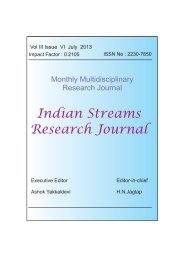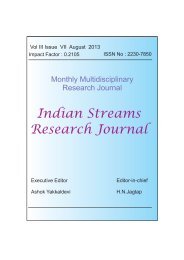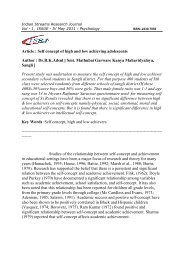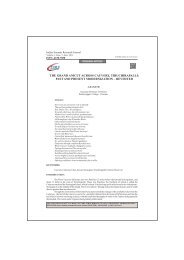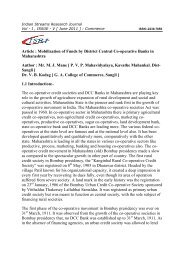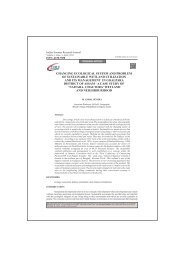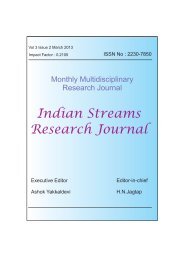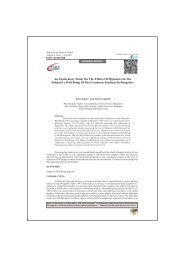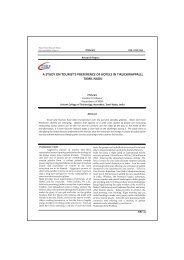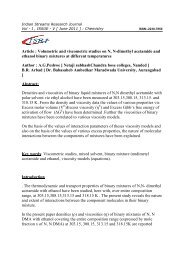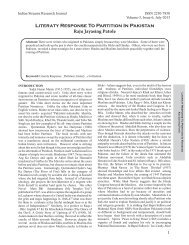Indian Streams Research Journal
Indian Streams Research Journal
Indian Streams Research Journal
You also want an ePaper? Increase the reach of your titles
YUMPU automatically turns print PDFs into web optimized ePapers that Google loves.
Vol II Issue X<br />
Impact Factor : 0.2105 ISSN No : 2230-7850<br />
ORIGINAL ARTICLE<br />
Monthly Multidiciplinary<br />
<strong>Research</strong> <strong>Journal</strong><br />
<strong>Indian</strong> <strong>Streams</strong><br />
<strong>Research</strong> <strong>Journal</strong><br />
Executive Editor<br />
Ashok Yakkaldevi<br />
Editor-in-chief<br />
H.N.Jagtap
IMPACT FACTOR : 0.2105<br />
Welcome to ISRJ<br />
RNI MAHMUL/2011/38595<br />
ISSN No.2230-7850<br />
<strong>Indian</strong> <strong>Streams</strong> <strong>Research</strong> <strong>Journal</strong> is a multidisciplinary research journal, published monthly in English,<br />
Hindi & Marathi Language. All research papers submitted to the journal will be double - blind peer reviewed<br />
referred by members of the editorial Board readers will include investigator in universities, research institutes<br />
government and industry with research interest in the general subjects.<br />
Flávio de São Pedro Filho<br />
Federal University of Rondonia, Brazil<br />
Kamani Perera<br />
Regional Centre For Strategic Studies, Sri<br />
Lanka<br />
Janaki Sinnasamy<br />
Librarian, University of Malaya [<br />
Malaysia ]<br />
International Advisory Board<br />
Mohammad Hailat<br />
Dept. of Mathmatical Sciences,<br />
University of South Carolina Aiken, Aiken SC<br />
29801<br />
Abdullah Sabbagh<br />
Engineering Studies, Sydney<br />
Catalina Neculai<br />
University of Coventry, UK<br />
Hasan Baktir<br />
English Language and Literature<br />
Department, Kayseri<br />
Ghayoor Abbas Chotana<br />
Department of Chemistry, Lahore<br />
University of Management Sciences [ PK<br />
]<br />
Anna Maria Constantinovici<br />
AL. I. Cuza University, Romania<br />
Romona Mihaila<br />
Spiru Haret University, Romania<br />
Delia Serbescu<br />
Spiru Haret University, Bucharest,<br />
Romania<br />
Anurag Misra<br />
DBS College, Kanpur<br />
Titus Pop<br />
Ecaterina Patrascu<br />
Spiru Haret University, Bucharest<br />
Loredana Bosca<br />
Spiru Haret University, Romania<br />
Fabricio Moraes de Almeida<br />
Federal University of Rondonia, Brazil<br />
George - Calin SERITAN<br />
Postdoctoral <strong>Research</strong>er<br />
Editorial Board<br />
Horia Patrascu<br />
Spiru Haret University, Bucharest,<br />
Romania<br />
Ilie Pintea,<br />
Spiru Haret University, Romania<br />
Xiaohua Yang<br />
PhD, USA<br />
Nawab Ali Khan<br />
College of Business Administration<br />
Pratap Vyamktrao Naikwade<br />
Iresh Swami<br />
ASP College Devrukh,Ratnagiri,MS India Ex - VC. Solapur University, Solapur<br />
R. R. Patil<br />
Head Geology Department Solapur<br />
University, Solapur<br />
Rama Bhosale<br />
Prin. and Jt. Director Higher Education,<br />
Panvel<br />
Salve R. N.<br />
Department of Sociology, Shivaji<br />
University, Kolhapur<br />
N.S. Dhaygude<br />
Ex. Prin. Dayanand College, Solapur<br />
Narendra Kadu<br />
Jt. Director Higher Education, Pune<br />
K. M. Bhandarkar<br />
Praful Patel College of Education, Gondia<br />
Sonal Singh<br />
Vikram University, Ujjain<br />
Rajendra Shendge<br />
Director, B.C.U.D. Solapur University,<br />
Solapur<br />
R. R. Yalikar<br />
Director Managment Institute, Solapur<br />
Umesh Rajderkar<br />
Head Humanities & Social Science<br />
YCMOU, Nashik<br />
S. R. Pandya<br />
Head Education Dept. Mumbai University,<br />
Mumbai<br />
Govind P. Shinde<br />
Bharati Vidyapeeth School of Distance<br />
Education Center, Navi Mumbai<br />
Chakane Sanjay Dnyaneshwar<br />
Arts, Science & Commerce College,<br />
Indapur, Pune<br />
Awadhesh Kumar Shirotriya<br />
Secretary, Play India Play (Trust),Meerut<br />
G. P. Patankar<br />
Alka Darshan Shrivastava<br />
S. D. M. Degree College, Honavar, Karnataka Shaskiya Snatkottar Mahavidyalaya, Dhar<br />
Maj. S. Bakhtiar Choudhary<br />
Director,Hyderabad AP India.<br />
S.Parvathi Devi<br />
Ph.D.-University of Allahabad<br />
Sonal Singh<br />
Rahul Shriram Sudke<br />
Devi Ahilya Vishwavidyalaya, Indore<br />
S.KANNAN<br />
Ph.D , Annamalai University,TN<br />
Satish Kumar Kalhotra<br />
Address:-Ashok Yakkaldevi 258/34, Raviwar Peth, Solapur - 413 005 Maharashtra, India<br />
Cell : 9595 359 435, Ph No: 02172372010 Email: ayisrj@yahoo.in Website: www.isrj.net
<strong>Indian</strong> <strong>Streams</strong> <strong>Research</strong> <strong>Journal</strong><br />
Volume 2, Issue.10,Nov. 2012<br />
ISSN:-2230-7850<br />
ORIGINAL ARTICLE<br />
Available online at www.isrj.net<br />
HUMAN-RIGHTS IN MANAGEMENT— A GLOBAL<br />
LANGUAGE IN NEW MILLENNIUM<br />
TRILOK CHANDRA SRIVASTAVA<br />
Singhania University, Pacheri-Bari, Distt- Jhunjhunu [Rajasthan]<br />
Abstract:<br />
KEYWORDS:<br />
In new global era, no organisation can operate in an isolated environment.<br />
There is a greater need of interaction with a host of stakeholders associated with<br />
different geographical-areas and ethnic group who have their own cultures, perceptions<br />
and values. The work-place diversity, increased aspirations of the stakeholders and<br />
various laws, treaties and conventions have made it as an imperative for the corporatemanagement<br />
to embrace a new language of management which would respect and<br />
promote globally accepted human-rights of people<br />
Management, Human –Rights, Areas, Bussiness.<br />
INTRODUCTION<br />
Business and other organisational activities are essentially carried out in human-environment.<br />
These are conducted by the people and its beneficiaries, too, are the people and the society. Also, profitmotive<br />
is essentially to be materialized for the survival of the organisation. Here, the great question arises as<br />
to how to conduct organisational affairs with respect of human rights and why and to what an extent,<br />
human-rights are relevant in the organisational-functioning.<br />
With the passing of several laws by the national government and the international bodies with a<br />
view to protect and respect human-rights, it is of paramount importance for the managers to get acquainted<br />
themselves with such laws and regulations which have any relevance with regard to their organisational<br />
operations. These laws may be general and also industry-specific in nature.<br />
Modern business environment may be characterized by the globalisation of business,<br />
globalisation of communication and of course, globalisation of the concept of human-rights. At<br />
international level, the first comprehensive and universally accepted human-rights were documented in the<br />
Universal Declaration of Human Rights which was adopted on 10th December, 1948 by the United Nations<br />
General Assembly. It was envisaged as a common standard of achievement for all people and nations. As<br />
parts of the International Bill of Human Rights, two other covenants known as the International Covenant<br />
on Civil and Political Rights [ICCPR] and the International Covenant on Economic, Social and Cultural<br />
Rights [ICESCR] were adopted in 1966.<br />
At international level, there are some other laws which have significance for corporations<br />
operating at national and trans-national platforms, pertain to non-discrimination, prevention of child<br />
labour, anti-corruption, environmental protection, rights against displacement, rights of immigrants etc.<br />
The UN Global Compact, a voluntary initiative, asks corporate managements to embrace, support and<br />
enact, within their sphere of influence, a set of core values in the areas of human rights, labour standards, the<br />
environment and anti-corruption. Today's managers must be aware of such provisions.<br />
In April 2008, a report on business and human rights was released. It endorsed the framework –<br />
<strong>Indian</strong> <strong>Streams</strong> <strong>Research</strong> <strong>Journal</strong> • Volume 2 Issue 10 • Nov 2012
HUMAN-RIGHTS IN MANAGEMENT— A GLOBAL LANGUAGE IN NEW MILLENNIUM<br />
'Protect, Respect and Remedy', proposed by Professor John Reggie, the special representative of the UN<br />
Secretary General on Business and Human Rights. This report forms a strong foundation for discussion on<br />
business and human rights and provide deeper insight to managers as regards their responsibility to protect<br />
and promote human rights.<br />
In India, the Constitution has enshrined in itself a number of provisions in the form of fundamental<br />
rights of the citizens. Also, certain rights have been mentioned under the Directive Principles of the State<br />
Policy. Further the Government of India has shown its commitment for protection and respect for human<br />
rights by passing the Protection of Human Rights Act 1993 with subsequent amendments. There are various<br />
other laws to ensure welfare and safety of labour and provisions against exploitation , prevention of child<br />
labour alongwith providing for social security measures to industrial and commercial workers.<br />
A human rights approach mandates the corporate- management to respect all human rights<br />
without any option of choosing the issues at their discretion. A human rights framework prescribes a<br />
universally recognised people – oriented approach in respect of all policy decision. The preamble to the<br />
Universal Declaration of Human Rights states 'every individual and every organ of society' to promote and<br />
respect human rights. The term 'every individual and every organ of society 'excludes no one, no company<br />
or organisation… The Universal Declaration applies to all'. As such, organisations must be held<br />
accountable to uphold human rights practices with their day to day operations.<br />
In conclusion, human rights must be the core of all management decisions. It is imperative to<br />
internalize human-rights approach into internal management system of the organisation.Trans-national<br />
operations have brought about work-place diversity charactersied by differences in working culture,<br />
faiths,beliefs,aspirations and values. Observance of human rights will fetch miraculous outcome to the<br />
organisations in terms of ensuring greater harmony, high morale of work force, higher productivity, more<br />
goodwill, higher profitability and social legitimacy. Further, not only human rights of the employees but<br />
also of all stakeholders have to be taken into account. From this perspective, managers owe a great<br />
responsibility to imbibe their management practices with human-rights considerations so as to justify them<br />
in a most reasonable, objective and effective manner.<br />
2
Publish <strong>Research</strong> Article<br />
International Level Multidisciplinary <strong>Research</strong> <strong>Journal</strong><br />
For All Subjects<br />
Dear Sir/Mam,<br />
We invite unpublished research paper.Summary of <strong>Research</strong><br />
Project,Theses,Books and Books Review of publication,you will be pleased to<br />
know that our journals are<br />
Associated and Indexed,India<br />
International Scientific <strong>Journal</strong> Consortium<br />
OPEN J-GATE<br />
Scientific<br />
Associated and Indexed,USA<br />
Google Scholar<br />
EBSCO<br />
DOAJ<br />
Index Copernicus<br />
Publication Index<br />
Academic <strong>Journal</strong> Database<br />
Contemporary <strong>Research</strong> Index<br />
Academic Paper Databse<br />
Digital <strong>Journal</strong>s Database<br />
Current Index to Scholarly <strong>Journal</strong>s<br />
Elite Scientific <strong>Journal</strong> Archive<br />
Directory Of Academic Resources<br />
Scholar <strong>Journal</strong> Index<br />
Recent Science Index<br />
Scientific Resources Database<br />
<strong>Indian</strong> <strong>Streams</strong> <strong>Research</strong> <strong>Journal</strong><br />
258/34 Raviwar Peth Solapur-413005,Maharashtra<br />
Contact-9595359435<br />
E-Mail-ayisrj@yahoo.in/ayisrj2011@gmail.com<br />
Website : www.isrj.net



